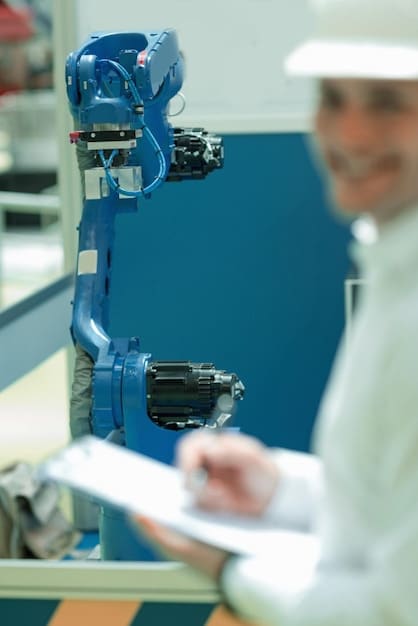The Future of Work: How Technology Reshapes the US Job Market

Technology is rapidly transforming the US job market, automating tasks, creating new roles in tech-related fields, and demanding a workforce skilled in data analysis, AI, and digital literacy.
The American job market is in constant flux, but the pace of change has accelerated dramatically in recent years. The Future of Work: How is Technology Reshaping the US Job Market? is no longer a distant concept; it’s a present reality, driven by rapid advancements in automation, artificial intelligence, and other digital technologies.
How Automation is Changing Job Roles
Automation, once confined to manufacturing, is now impacting a wide range of industries, from customer service to healthcare. As machines become more capable of performing routine tasks, the roles of human workers are evolving, requiring new skills and adaptability.
The Rise of Robotic Process Automation (RPA)
Robotic Process Automation (RPA) is a software technology that allows businesses to automate repetitive, rule-based tasks. RPA can handle everything from data entry to processing transactions, freeing up human employees to focus on more strategic and creative work.
Impact on Manufacturing and Production
In manufacturing, automation has led to increased efficiency and productivity, but also to job displacement. As robots and automated systems take over tasks previously performed by human workers, manufacturers are investing in retraining programs to help employees transition to new roles.
- Increased efficiency and output in manufacturing processes.
- Reduction in human errors and improvement in product quality.
- Shift in workforce demand towards robotics maintenance and programming.
- The need for continuous learning and adaptation for workers.
The integration of automation technologies is reshaping the skill sets required in the manufacturing sector. Employees now need to be proficient in operating and maintaining complex automated systems.

The future of manufacturing jobs will involve a blend of technical expertise and problem-solving capabilities, underlining the importance of continued education and training to remain competitive in an evolving labor market.
The Growing Demand for Tech Skills
As technology becomes more pervasive, the demand for workers with tech skills is skyrocketing. From software developers to data scientists, companies across all industries are seeking individuals who can build, maintain, and leverage technology to drive innovation and growth.
The Shortage of Skilled Tech Workers
Despite the growing demand, there is a significant shortage of skilled tech workers in the US. This shortage is driving up salaries and making it difficult for companies to find the talent they need to compete in the global economy.
Education and Training Initiatives
To address the skills gap, educational institutions and companies are launching new training programs and initiatives designed to prepare workers for tech-related roles. These programs focus on providing hands-on experience and practical skills that are in high demand among employers.
- Coding bootcamps offering accelerated training in software development.
- University programs tailored for data science and artificial intelligence.
- Corporate initiatives focused on upskilling existing employees in tech roles.
- Online learning platforms providing flexible access to technical education.
Partnerships between educational institutions and industry players are crucial in ensuring that the curricula align with the real-world demands of employers, creating a pipeline of qualified candidates ready to enter the tech workforce.
Investing in education and training is vital for workers looking to transition into tech-related fields. Continuous learning and skill development are essential to keep up with the rapid pace of technological change.
The Impact of AI and Machine Learning
Artificial intelligence (AI) and machine learning are rapidly transforming industries by automating complex tasks and enabling new insights from data. These technologies are already having a significant impact on the job market, and their influence is only expected to grow.
AI-Driven Job Displacement
AI is capable of performing tasks that previously required human intelligence, such as analyzing data, making decisions, and even creating content. This has raised concerns about AI-driven job displacement, particularly in roles that involve repetitive or routine work.
The Creation of New AI-Related Jobs
While AI may displace some jobs, it is also creating new opportunities in fields such as AI development, data science, and AI ethics. These new roles require specialized skills and knowledge, and are expected to be in high demand in the coming years.
- Development of algorithms for autonomous systems and AI applications.
- Analysis of large data sets to generate insights and improve decision-making.
- Evaluation of ethical considerations related to AI implementations.
- Management of AI projects and integration with existing systems.
The development and ethical considerations surrounding AI systems are becoming more important as AI’s presence increases across various industries. This shift brings new opportunities for specialized positions that require creativity and expertise.

Workers will need to adapt by acquiring skills that complement AI technologies, such as creativity, critical thinking, and emotional intelligence. These qualities are less easily replicated by machines and will be essential for success in the AI-driven job market.
The Rise of the Gig Economy
The gig economy, characterized by short-term contracts and freelance work, has grown rapidly in recent years. This model offers flexibility and autonomy for workers, but also raises concerns about job security and benefits.
The Benefits and Drawbacks of Gig Work
For workers, the gig economy offers the opportunity to set their own hours, work from anywhere, and choose projects that align with their interests and skills. However, it also means dealing with inconsistent income, lack of benefits, and the need to constantly market oneself to find new work.
Platforms Facilitating Gig Work
Platforms such as Upwork, Fiverr, and TaskRabbit have made it easier for workers to find gig work and for companies to access a global pool of talent. These platforms provide a marketplace for freelance services, connecting workers with clients seeking specific skills and expertise.
The rise of gig work necessitates new considerations for employment policies, addressing issues like worker classification, wage standards, and access to benefits. Policymakers and stakeholders are actively discussing solutions to support gig workers’ rights.
The gig economy is transforming how work is structured and perceived, highlighting the need for adaptable skills and entrepreneurial mindsets, as well as ongoing discussions about labor protections and economic stability.
The Importance of Lifelong Learning
In a rapidly changing job market, the ability to learn new skills and adapt to new technologies is more important than ever. Lifelong learning is becoming essential for workers who want to remain competitive and advance in their careers.
Online Education and Training Resources
The internet has democratized access to education, with a wealth of online courses, tutorials, and training resources available at little or no cost. Platforms such as Coursera, edX, and Khan Academy offer courses in a wide range of subjects, allowing workers to learn new skills at their own pace and on their own schedule.
The Role of Employers in Supporting Employee Development
Companies also have a role to play in supporting employee development by providing training opportunities, mentoring programs, and tuition reimbursement. Investing in employee development can help companies retain talent, improve productivity, and stay ahead of the competition.
The commitment to lifelong learning underscores an investment in one’s future employability. Individuals must take responsibility for their continuous development and actively seek opportunities for upskilling and reskilling.
Embracing a mindset of continuous learning fosters adaptability and resilience among workers, enabling them to navigate the evolving demands of the modern workplace successfully.
The Future of Work in Specific Industries
Different industries are experiencing the technological reshaping of the job market in unique ways. The following examples illustrate how technology is impacting specific sectors and what future developments might look like.
Healthcare
Technology in healthcare is becoming increasingly sophisticated, leading to changes in how medical professionals work. Telemedicine, AI-assisted diagnostics, and robotic surgery are becoming more common, requiring healthcare workers to adapt their skills.
Finance
The finance industry is also undergoing a technological transformation, with automation and AI playing an increasing role in areas such as trading, risk management, and customer service. Financial professionals need to develop skills in data analysis and programming to stay relevant in this changing landscape.
- The financial sector uses algorithmic trading and AI for portfolio management.
- Blockchain technology impacts transaction and security processes.
- Customer experience is enhanced through AI-powered chatbots.
- FinTech innovation creates new job roles and demands upskilling in finance.
In finance, the convergence of technology and financial expertise is driving innovation and efficiency, necessitating that financial professionals stay abreast of rapidly evolving tools and methodologies.
The intersection of technology and finance is creating opportunities for those who embrace lifelong learning, allowing them to leverage technological advances to deliver more innovative and impactful solutions in the financial sector.
| Key Finding | Brief Description |
|---|---|
| 🤖 Automation Impacts | Automation transforms job roles, demanding new skills in manufacturing and beyond. |
| 💻 Tech Skills Demand | There is a growing need for tech-skilled workers, prompting training initiatives. |
| 💡 AI’s Double Role | AI displaces some jobs but creates new roles in AI development and ethics. |
| 📚 Lifelong Learning | Continuous learning is crucial for workers to remain competitive in the changing market. |
Frequently Asked Questions
▼
Technology is creating new jobs in fields like AI, data science, and cybersecurity, while also transforming existing roles to require more digital and analytical skills.
▼
Critical skills include data analysis, digital literacy, coding, and the ability to adapt to new technologies. Soft skills such as communication and problem-solving are also crucial.
▼
Workers can prepare by upskilling in areas like data analysis, software development, and AI. Focusing on skills that complement automation, such as creativity and critical thinking, is also important.
▼
Online education provides flexible and accessible resources for continuous learning. Workers can use online platforms to acquire new skills and stay competitive in the job market.
▼
The gig economy offers flexibility but also raises concerns about job security and benefits. It is transforming how work is structured, requiring new policies to support gig workers’ rights.
Conclusion
In conclusion, technology is fundamentally reshaping the US job market, presenting both challenges and opportunities. By embracing lifelong learning, acquiring in-demand skills, and adapting to new ways of working, individuals and organizations can thrive in the evolving landscape of the future of work.





